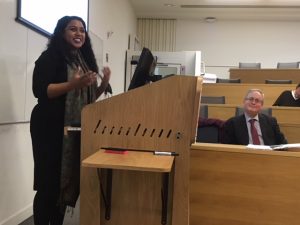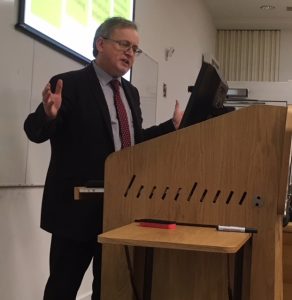 On Monday 22 January 2018, as part of our Lent Term Seminar series, Sara Dilmamode (Citiesmode) and Andrew Barry-Purssell (Westminster Council) gave a fascinating presentation on planning tools, focusing on how development plans fit within a plan-led system. Click here to download the PPT presentation slides.
On Monday 22 January 2018, as part of our Lent Term Seminar series, Sara Dilmamode (Citiesmode) and Andrew Barry-Purssell (Westminster Council) gave a fascinating presentation on planning tools, focusing on how development plans fit within a plan-led system. Click here to download the PPT presentation slides.
The presentation followed the sometimes tortuous route of plan making from the creation of an evidence base, to policy formation, to deposit, to Examination in Public, to alterations and finally to adoption. It was noted that the average time taken for a local authority to adopt a local plan was roughly five years with many still not adopted after 10 years.
This excellent animation, created by Citesmode captures the process:
The speakers gave concrete examples of development challenges faced by planners during this process including changing infrastructure (for example the creation of the Elizabeth Line/Crossrail 1) to changing economic cycles to population fluctuations.
They reminded the audience that planning is always about politics and context and not only about evidence. The context varies because of the multiplicity of users, different objectives at different scales, different timeframes and economic variance. The role of the development plan is then to be as realistic as possible while showing some flexibility.
 One question raised by the students was how S106 differs from Community Infrastructure Levy (CIL).
One question raised by the students was how S106 differs from Community Infrastructure Levy (CIL).
The presenters explained that S106 was created as a way to address mitigation of impact from developments but with time, its remit has increased to include things like the provision of social housing. CIL, the only tax planners can raise, was developed for the funding of infrastructure and works best where there are developments with large amounts of floorspace.
Again, this very interesting animation from Citiesmode helps explain:
Click here to download the PPT presentation slides.
Sara Dilmamode MSc MRTPI is Director of CitiesMode where she leads on urban planning projects. Sara graduated from the London School of Economics with a MSc in Regional and Urban Planning and is a chartered urban planner with more than 15 years of experience in the private and public sector, including roles at GVA, Southwark Council and Tower Hamlets Council
Sara has significant expertise in plan making, developer contributions (community infrastructure levy and planning obligations) and planning process improvement projects. She is currently leading on research for the LGA on spending up housing delivery. An experienced trainer, she has worked with the Planning Advisory Service and MHCLG to delivery training events across the country on changes to the planning system. She is currently on a secondment.
Sara is interested in innovative urban planning practice and helping to demystify and explain complex planning processes. She has produced a series of ‘planimations’ about core planning concepts and developed the Planning TV project with Dentons’ leading Planning and Public Law team.
Andrew Barry-Purssell graduated in Law from what was then Queen Mary College and has a Master of Arts in Social and Political Theory and a Diploma in Town Planning. He has held a number of policy roles, including working for the Association of District Councils (one of the forerunners of the Local Government Association) and the British Retail Consortium. In 1998 he became Head of Development and Regeneration at Barnet Council (which included planning). In 2001 he joined the Greater London Authority, working for the London Assembly and Ken Livingstone’s Business and Economic Policy Advisor before moving to head the team that prepared the 2011 version of the London Plan and put the Mayor’s Community Infrastructure Levy in place. Since 2013 he has worked at Westminster Council, currently as Place and Investment Policy Manager, which includes responsibility for the Westminster City Plan.





